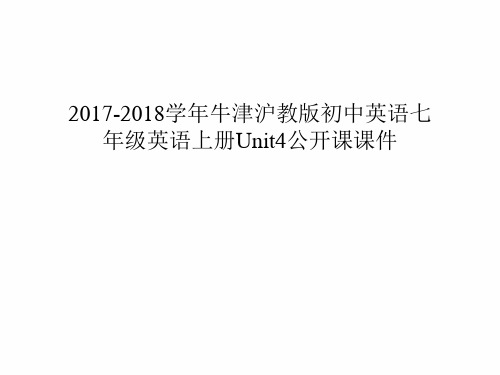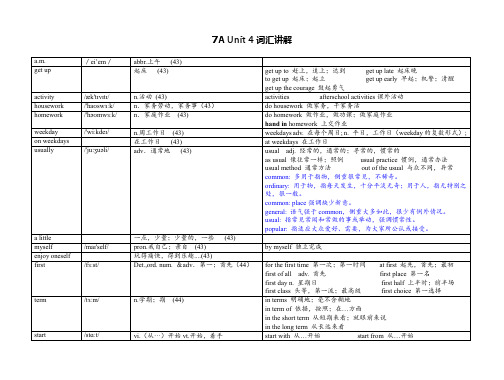英语七年级上册牛津版Unit 4 第4课时-听说
- 格式:ppt
- 大小:1.10 MB
- 文档页数:20



7AU4知识点New words and expressions:1.wake up.He wakes up at six o’clock.1.He wakes her up at seven o’clock.2/Shall we go fishing this afternoon?OK/Good idea! That’s all right. (No,let’s go shopping.3.He seldom goes out.He’s never late for school.4.She has breakfast/lunch/dinner.5.I need to go home early6.have a good rest7.have fun/have a good (great) time (in) doing sth.I have fun playing football8.have lessons/have an English lesson.9.after-school activities10.do one’s homeworkHe does his homework/We do our homework.He doesn’t do his homework./Does he do his homework?11.go to bed. He goes to bed at 9/He gets up at six .12.be late for He is late for school/the meeting.13.The meeting/Our school starts at 8 o’clock.14.a quarter past six/seven half past eight15.at six in th emorning/afternoon16.play football first.17.chat with him/her chat with each other18.learn from each other/ help each other19wish best wishes wish you successWish your team good luck.20.would like to go shopping.Would you like to go shopping this afternoo ?21.save my life---save their lives.22.go to the museum.23twice a week/once a year. How often does he go home?24.go on a picnic=go on picnics25.dislike playing games27.get ready for th eparty/th emeeting.28.learn a lot about the worldLanguage points: 1.It’s time for breakfast=It’s time to have breakfast2.Shall we go running/walking in the hill?3.I seldom go out /play games.4.After sleep I sleep.5.nad a good rest/He needs some milk.6.I don’t know how to have fun/what to do /how to do it/where to go7.What time do you strat lessons?8enjoy myself/enjoy working in Beijing/living in Shanghai.9.talk about playing games.10.from Monday to Friday—five days a week.11.Our lessons begin at 8:15.12.My favourite subject is English/sport is swimming.13.a lot of friends—lots of /many14.They are all nice(kind) to us---All of them are nice to us.15.a Reading Club16.read books/borrow books from the library.17.I also like playing volleyball.18.I’m in the school volleyball team=I’m a member of the school team.19.on Wednesday afternoon20.in the evening/in March/in winter/in 2202/in 2012.321.on Saturday/on 1 July/on Sunday morning/on Children’s Dayon a cold morningo/ on the afternoon of September 122.at seven o’clock/at 6 years old/at Christmas23.Thanks for your e-mail/giving me a pen/helping us with our English.24.tell you about my life/tell us about your school.25.I’m good at playing football=I play footballwell.26.He often plays football in the playground.27.She doesn’t have lunch time to play tennisShe has atime to sing.28.She’s a member of th eswimming team.She usually swims after school.29.He never plays basketball.30.He goes to her dancing lessons.31.She always dances for half an hour.32.She sometimes goes roller skating.33.Saturday ,7 November.34.Welcome to our schol/our school football match.35.There’s a volleyball match between A and B.36.He goes there by bus.37.I hope everyone can come and watch the game.38Wish our team good luck.39.What do you like to do at weekends?40.How often do you visit the Great Wall.Twice a month41.Morning exercises are good fo rus.42.Reading in th esun is bad for your eyes.43.have too much homework to do.44.so I can’t play basketball well.45.It helps me get ready for the day.48.I don’t like singing.49.It’s fun/interesting.。

7A Unit 4词汇讲解a.m./ei’em/abbr.上午(43)get up 起床(43)get up to 赶上,追上;达到get up late 起床晚to get up 起床;起立get up early 早起;机警;清醒get up the courage 鼓起勇气activity/æk'tɪvɪtɪ/n.活动(43)activities afterschool activities课外活动housework/'haʊswɜːk/n.家务劳动,家务事(43)do housework 做家务,干家务活homework/'həʊmwɜːk/n.家庭作业(43)do homework 做作业,做功课;做家庭作业hand in homework 上交作业weekday/'wiːkdeɪ/n.周工作日(43)weekdays adv. 在每个周日; n. 平日,工作日((weekday的复数形式); on weekdays 在工作日(43)at weekdays 在工作日usually/'ju:ʒuəli/adv.通常地(43)usual adj. 经常的,通常的;寻常的,惯常的as usual 像往常一样;照例usual practice 惯例,通常办法usual method 通常方法out of the usual 与众不同,异常common: 多用于指物,侧重很常见,不稀奇。
ordinary: 用于物,指每天发生,十分平淡无奇;用于人,指无特别之处,很一般。
common: place强调缺少新意。
general: 语气强于common,侧重大多如此,很少有例外情况。
usual: 指常见常闻和常做的事或举动,强调惯常性。
popular: 指适应大众爱好、需要,为大家所公认或接受。
a little一点,少量;少量的,一些(43)myself/maɪ'self/pron.我自己;亲自(43)by myself 独立完成enjoy oneself玩得痛快,得到乐趣 (43)first/fɜːst/Det.,ord. num. &adv.第一;首先(44)for the first time 第一次;第一时间at first 起先,首先;最初first of all adv. 首先first place 第一名first day n. 星期日first half 上半时;前半场first class 头等,第一流;最高级first choice 第一选择term/tɜːm/n.学期;期(44)in terms 明确地;毫不含糊地in term of 依据,按照;在…方面in the short term 从短期来看;就眼前来说in the long term 从长远来看start /stɑːt/vi.(从···)开始vt.开始,着手start with 从…开始start from 从…开始n.开头,开端(44)at the start 开始at the start of 在…开始的时候start in 开始from the start 从一开始start up v. 开始;发动;突然站起;突然出现start at 开始于…;以…开始;因…吃惊start on v. 开始进行start for 出发,启程;动身去start out 出发;著手进行start off 出发,开始start point 出发点;起始点start doing/ to do sth 开始做某事writer/'raɪtə/n.作家(44)language/ˈlæŋɡwidʒ/n.语言(44)foreign language(s) n. 外语;外文language learning 语言学习second language 第二语言body language 身体语言natural language 自然语言spoken language 口语,口头语言;出声语言common language 共同语;公用语言native language 本国语言;本机语言;机器各单元间编码语言amazing/ə'mezɪŋ/adj.令人大为惊奇的(44)biology/baɪ'ɒlədʒɪ/n.生物学(44)biological adj. 生物学的;生物的living/'lɪvɪŋ/adj.活着的,活的(44)n. 生计;生存;生活living environment 生活环境living room 客厅,起居室living standard 生活水平,生活标准standard of living 生活水平;生活标准living space 生存空间living condition 生活条件;居住环境make a living 谋生,维持生活cost of living 生活费,生活费用for a living 为了生存;为…谋生living thing 生物living level 生活水平earn a living 谋生;活命living habit 生活习惯;生活方式alive: 其反义词为dead,指生命从奄奄一息到精力旺盛的各种状态。

牛津译林版七年级英语上册Unit4 重点词组、难点解析、语法知识点复习【词组总汇】1.wake up 醒来2.it’s time for+名词是做某事的时间了, 该做某事了It’s time to do3.go to sleep 去睡觉4.how to have fun 如何玩得开心5.get up 起床6.after-school activities 课外活动7.do morning exercises 做早操8.have lessons 上课9.eat breakfast/lunch/supper 吃早/中/晚餐10.go home 回家11.do one’s homework 做家庭作业12.watch TV 看电视13.go to bed 上床睡觉14.write to sb 写信给某人15.school life 学校生活16.lots of/a lot of 许多;大量17.at lunchtime 在午餐时间18.chat with each other 彼此聊天chat with sb 和某人聊天/闲谈19.be nice to sb 对某人好20.every morning 每天早晨21.every day 每天22.every Tuesday 每周星期四23.after school 在放学后24.a member of ……中一员25.the Swimming Club 游泳兴趣小组26.have a good time 玩的开心27.email sb 给某人发电子邮件28.play games 玩游戏, 进行比赛29.twice a week 一周两次30.have fun 娱乐,乐趣;开心P.27-3031.listen to the radio 听收音机32.make a model plane 制作模型飞机33.read newspapers 看报read books 看书34.write emails 写邮件35.watch football matches 看球赛36.watch too much TV 看电视太多37.listen to music 听音乐38.listen to the teacher 听老师讲39.walk a dog 遛狗40.a piece of good news 一则好消息41.in the school football team 在学校足球队42.all the time 一直43.know (a lot) about…对……了解(很多)44.read comic books 看连环漫画书45.on the volleyball court 在排球场46.from...to…从……到……47.meet up with sb. 约见某人48.do their homework 做他们的作业49.under a big tree 在大树下50.go to one’s dancing lesson 去上舞蹈课51.have (no) time to do sth. 有(没有)时间做某事52.have a lot of new friends 有许多新朋友53.teach us English 教我们英语54.talk about…谈论关于……55.at home 在家56.say hello to…向……问好P.31-3757.the Class 1,Grade 7 students 七年级一班学生58.go on a trip 旅行, 旅游have one’s trip59.look at the posters 看海报60.more than 多于;超过61.twice a week 一星期两次62.the China Space Museum 中国航空博物馆63.the China Science and Technology Museum 中国科技博物馆64.next Monday 下周一65.each student 每个学生66.thank you for doing sth 为做某事而谢谢你anize the class trip 组织班级旅游68.I would like to+动词原形愿意干某事;想要干某事69.the price for………的价格70.be open/be closed 开着、关着71.look forward to…期盼;盼望72.enjoy…very much 非常喜爱……73.need to do sth 需要做……74.borrow a pen 借一支钢笔75.be busy doing 忙于做某事76.be good for 有益于77.help sb do sth 帮助某人做某事78.get ready for 准备……79.learn more about 更多了解……80.the answer to ………的答案81.the Computer Club 电脑兴趣小组【难点解析】1.Is it time for breakfast? 是吃早餐的时间了吗?it’s time for+名词, “是做某事的时间了, 该做某事了”=it’s time to+动词原形.例如:It’s time for class.是上课的时间了。

七年级上册英语单词听写第四单元带汉语Unit 4Part One: Word DictationLesson 1: Family and Friends1. mother [ˈmʌðər] 母亲2. father [ˈfɑːðər] 父亲3. sister [ˈsɪstər] 姐妹4. brother [ˈbrʌðər] 兄弟5. grandmother [ˈɡrænˌmʌðər] 奶奶6. grandfather [ˈɡrænˌfɑːðər] 爷爷7. aunt [ænt] 姑妈/阿姨8. uncle [ˈʌŋkəl] 叔叔9. cousin [ˈkʌzn] 堂兄弟/堂姐妹10. friend [frend] 朋友Lesson 2: The House1. living room [ˈlɪvɪŋ ˌruːm] 客厅2. bedroom [ˈbedˌrum] 卧室3. kitchen [ˈkɪtʃən] 厨房4. bathroom [ˈbæθˌrum] 浴室5. garden [ˈɡɑːrdn] 花园6. stairs [steərz] 楼梯7. garag e [ˈɡærɪdʒ] 车库8. balcony [ˈbælˌkəni] 阳台9. door [dɔːr] 门10. window [ˈwɪndoʊ] 窗户Lesson 3: Daily Routine1. get up [ɡet ʌp] 起床2. have breakfast [hæv ˈbrekfəst] 吃早餐3. go to school [ɡoʊ tu skul] 上学4. have lunch [hæv lʌntʃ] 吃午饭5. do homework [duː ˈhoʊmˌwɜːrk] 做作业6. play games [pleɪɡeɪmz] 玩游戏7. watch TV [wɑtʃ ˈtiːˌviː] 看电视8. go to bed [ɡoʊ tu bed] 上床睡觉9. brush teeth [brʌʃtiθ] 刷牙10. wash face [wɔʃ feɪs] 洗脸Lesson 4: School Life1. classroom [ˈklæsˌrum] 教室2. schoolbag [ˈskulˌbæɡ] 书包3. blackbo ard [ˈblækˌbɔːrd] 黑板4. desk [desk] 课桌5. chair [tʃer] 椅子6. notebook [ˈnoʊtˌbʊk] 笔记本7. textbook [ˈtɛkstˌbʊk] 教科书8. pen [pɛn] 钢笔9. pencil [ˈpɛnsəl] 铅笔10. ruler [ˈruːlər] 尺子Part Two: Sentences Dictation1. My mother is a teacher. - 我的妈妈是一名老师。
七年级英语上册各课详细练习及答案译林牛津版目录Unit 1 This is me! 1Unit 2 My day 16Unit 3 Let’s celebrate! 31Unit 4 Food 45Unit 5 Going shopping 60Unit6 Fashion 73}Answers88!~{Unit 1 This is me!%Welcome to the unit一、词组翻译:1. 一只电子狗______________2. 我的主人__________________3. 看书_____________________4. 早上好__________________5. 如何照顾Kitty_______________6. 晚上好_________________7. 遇到新朋友____________ 8. 晚安_____________________________ 9. 北京阳光中学_____________________ 10. 他们第一堂英语课__________________二、选择填空:…( )1. This is a very interesting book with lots of new words. Please ______ it carefully.A. lookB. seeC. look atD. read( )2. I really love sports. Can you tell me how ___ like a good swimmerA. swimsB. to swimmingC. to swimD. swimming ( )3. The teacher asks the students to write an article______ the Mid-Autumn Day.A. inB. ofC. aboutD. at( )4. Please introduce yourselves ______ each other.A. toB. withC. andD. about—( )5. Excuse ______, are ______my new classmateA. me, youB. my, yourC. I, youD. me, your( )6. Let’s ______ each other.A. make friendsB. make friends toC. make friend withD. make friends with( )7. — ___________ — My name is Mark.A. Are you MarkB. What’s this in EnglishC. Hello, Mark.D. What’s your name( )8. What ______ your sister’s nameA. areB. doesC. isD. were,( )9. —It’s time to go to bed, Lily! — Ok. ______, Mummy.A. Good morning.B. Good afternoon.C. Good eveningD. Good night( )10. Here is a bag. Could you carry________ for the old manA. itB. itsC. it’sD. them三、动词填空:1. Sandy and Lucy __________ (be) in the same class.2. Do you __________ (know) that girl3. Daniel __________ (wear) glasses every day.、4. Millie often __________ (fly) a kite with her brother.5. She __________ (not like) comic books.6. Does Simon __________ (watch) TV on Saturday7. —Where does he have lunch— He always__________ (have) lunch at school.8. They want __________ (play) table tennis.9. Dave usually __________ (go) running in the morning.10. Cats enjoy __________ (eat) fish.—四、完成对话:(A)L: Hello.M: Hi!L: My name __________ Liu Mei. __________ your nameM: __________ Mike.L: Nice to meet you!M: __________ __________ __________ __________, too.$L: __________ be friends.(B)Joan: Good morning!Ann: __________ __________!Joan: __________ __________ __________Ann: My name is Ann.Joan: Nice to meet you.Ann: __________ __________ __________ __________, __________.@Joan: Welcome to our school.Ann: __________ __________.Reading(1)一、词组翻译:1. 戴眼镜___________2. 喜欢阅读__________________________3. 读书俱乐部__________________4. 喜欢跳舞___________________5. 努力学习_______________6. 喜欢玩电脑游戏____________________7. 擅长游泳_______________8. 出生于____________________________ -9. 居住在苏州______________ 10.来自北京__________________________二、根据句意和汉语注释,在空格内写出各单词的正确形式:1. His father is a kind man. He is very __________(乐于助人)can find Millie in the__________(阅读)room.3. Do you want __________(居住)in Shanghai4. She __________(有)black hair and big eyes.5. Mary enjoys __________(游泳)in summer.6. He is a __________(有趣)boy. We all like him.^7. Are you good at __________(跳舞)8. I was __________(出生)in Shanghai.9. The man with __________(眼镜)is my English teacher.10. We are __________(主人)of our country.三、选择填空:( )1. Where ______ my glasses I can’t find______.A.is, itB. does, itC. are, themD. do, them( )2. My cousin is ______.。
牛津译林版七上Unit 4 知识点梳理1.Wake up, Eddie. 醒醒,埃迪。
wake up:“醒来”。
“唤醒某人”:如果所接宾语是人称代词,只能放在wake和up中间;如果所接宾语是名词,放在up、前后均可。
awake:adj.“醒着的”。
2.Is it time fro breakfast? 到吃早饭的时间了吗?It’s time for sth.“是做某事的时间了。
”= It’s time to do sth.It’s time for sb. to do sth.“该是某人做某事的时候了。
”3.Shall we go walking in the hills? 我们去山上散步好吗?Shall we...? “我们……好吗?”(表示征求或提出建议。
)4.I seldom go out. 我很少外出。
seldom:adv.“很少,不常,难得”(位于行为动词之前,助动词、情态动词或连系动词之后),表示否定。
go out:“出去”。
5....and then I have lunch. ……然后吃午饭。
have lunch:“吃午饭”。
→have breakfast “吃早饭”;have dinner/supper “吃晚饭”。
have:v.“吃;喝”;“有”;“举办,举行”;“度过,经历”。
三单:has。
6.After lunch, I always need a good rest. 午饭后,我总是需要好好休息。
need:v.“需要”。
need sth. “需要某物”;need to do sth. “需要做某事”;need sb. to do sth. “需要某人做某事”;sth. need(s) doing “需要”。
情态动词,“需要”,后接动词原形,常用于否定句和疑问句。
rest:n.“休息,歇息”(= break)。
have a (good) rest “(好好)休息”。
作动词,“休息”。
Chapter 4 The world of numbersListening & SpeakingBy Ding Yuan 丁园●TheAnalysis of the Text1. Background on the reformation of curriculum, this text book emphasizes much on cultivating students’ interests of learning English by using materials in our r eal daily life. And it also encourages the communicative and cooperative way of study.2. This chapter is a very essential unit, not only because the topic of numbers is a common used one in almost all the English examications, but also because it is an important elements in our daily life.3. Listening and Speaking skills about numbers are always the focuses and difficult points in English language teaching and learning.There are 5 sections in this chapter:Reading, Listening, Language, Speaking, Writing. In order to address the needs of my students more effectively, I would like to adapt the text into 4 parts:Reading——needs 2 teaching periods(TP).Listening & Speaking——needs 1 TPLanguage——needs at least 2TPWriting——needs at least 1TP●Teaching plan for Part 2——Listening & speakingI. Analysis of the StudentsThey have known——1. the names of different kinds of numbers;2. how to read out those numbers;They may not be able to——1. recognize the English expressions about numbers in our daily life by listening.2. do some simple calculation presented in English.II. Teaching Aims1. Enable the students to recognize different kinds of numbers in our daily life by listening.2. Enable the students to do some simple calculation.III. Teaching Focus and Difficulties1.Focuses:a. different kinds of numbers in everyday life;b. simple calculations;c. listening and speaking skills about numbers;2. Difficulties: developing students’ listening and speaking skills about numbers.IV. Teaching Aids and Methods1. Aids: some pictures; multi-media computer2. Methods: task-based method, communicated method, group cooperate method。